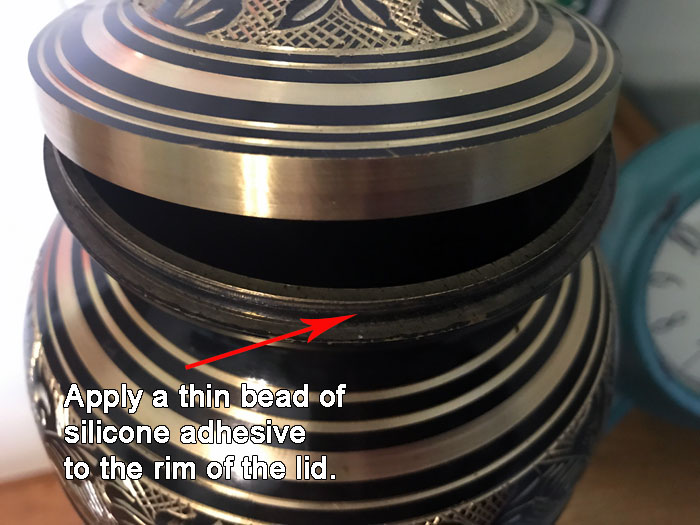Sealing Cremation Urns — Creating a Permanent Closure
Whether or not to seal a cremation urn is a personal decision that depends on the type of urn, if it will be displayed or buried, and your unique circumstances. The sealing process is not difficult, but it can be surprisingly emotional. For many people, sealing the urn represents a final step in their loved one’s journey. With that in mind, it’s best to set aside some quiet time so that you can take it at your own pace.
Metal Urns

Most metal cremation urns have a threaded cap or removable disc that covers the ash compartment. To create a permanent seal, add a small amount of clear, silicone epoxy or metal glue to the threads before closing the lid. Take your time, and be sure to wipe away any overspill quickly.
Sealing cremation urns that are made of metal — bronze and brass, for example, is usually not necessary. Some people however prefer the added sense of security that the glue can provide.
>>Cremation Urns: How to Buy and What to Look For
Ceramic or Glass Urns
Many ceramic and glass urns are designed with a cap that rests on the top of the urn’s body but is not threaded. To seal the lid to the urn, use a clear silicone sealant. The sealant will help provide water resistance and create a permanent airtight seal.
When sealing cremation urns that are made of ceramic or glass, carefully squeeze a thin bead of sealant around the cap, then place the cap back on the urn, gently pressing it into place. Be sure to follow the directions on the adhesive with regard to drying time. We recommend you let the sealant dry for 24 hours before handling it.
Sealants can be purchased at big box store, hardware stores, online, and where ever home repair goods are sold. Avoid glues that expand or foam. While soap and water cleanup is not essential, it is a big bonus.
Wooden Urns
Most wood urns close in a box-like fashion or have a sliding panel at the bottom that is removable. There is no need to seal, but some people prefer to do so. Wood glue or a glue designed for porous materials will work for this purpose. Just remember that you are creating a permanent seal so if you change your mind you may not be able to reopen the box.